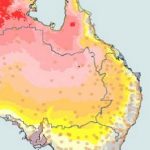 December 12, 2020 4:43 pm
Published by Climate Extremes
December 12, 2020 4:43 pm
Published by Climate Extremes
The past four months have seen the Heatwaves and Cold Air Outbreaks research program focus very much on improving our capacity to understand and help others in research and industry get an insight into the impact of extreme heat events.
 December 12, 2020 3:29 pm
Published by Climate Extremes
December 12, 2020 3:29 pm
Published by Climate Extremes
The challenges of 2020 have impacted our briefing notes but we combined forces with NESP ESCC to produce an impressive overview of climate sensitivity. Our mid-term review has invigorated the team and a science-teacher workshop is well underway for AMOS.
 August 18, 2020 10:51 am
Published by Climate Extremes
August 18, 2020 10:51 am
Published by Climate Extremes
The Knowledge Brokerage Team farewells James Goldie who moves ot the Monash Climate Change Communications Research Hub, adds a briefing note highlighting sudden stratospheric warming, and increases its reach in developing school lesson plans.
 July 29, 2020 11:40 am
Published by Climate Extremes
July 29, 2020 11:40 am
Published by Climate Extremes
CLEX researchers and colleagues have highlighted the need for the development of systems to predict marine heatwaves, which are a growing threat to marine ecosystems and industries as the climate changes.
November 4, 2019 3:02 pm
Published by Climate Extremes
Simon Marsland (CSIRO/ESCC Hub/CLEX/IMAS). Ensuring Australian climate model simulations inform global climate assessments. Earth Systems and Climate Change Hub Science Webinar Series. Full details and registration here.
October 16, 2019 3:27 pm
Published by Climate Extremes
Overview The ocean has absorbed 93% of global warming heat. This service by the ocean to life on Earth has not been without consequence. The oceans are warming rapidly, ocean species are being displaced and sea level rise threatens many coastal communities. The pathway for heat to enter the deep ocean is primarily through dense water formation in the North Atlantic and around Antarctica. This large-scale conveyor from the surface to the deep ocean is known as the Meridional Overturning... View Article
 August 1, 2019 4:00 am
Published by Climate Extremes
August 1, 2019 4:00 am
Published by Climate Extremes
Melissa Hart recounts the recent winter school and introduces "the alumni sessions", where CLEX alumni from a broad range of industries and career paths share career advice and strategies.
 January 29, 2019 2:32 pm
Published by Climate Extremes
January 29, 2019 2:32 pm
Published by Climate Extremes
In this webinar, John Clarke will provide a demonstration of how to use the newly released Thresholds Calculator v2.0 to estimate the frequency of future hot, cold, wet and dry extremes under different emissions scenarios.
 December 7, 2018 3:09 pm
Published by Climate Extremes
December 7, 2018 3:09 pm
Published by Climate Extremes
As the year draws to a close and we pause to look back over 2018, it’s not surprising that with the ending of the ARC Centre of Excellence for Climate System Science (ARCCSS) on June 30 and the ARC Centre of Excellence for Climate Extremes (CLEX) building up a head of steam after its first full year, we have packed a lot into the past 12 months.
 November 27, 2018 11:13 am
Published by Climate Extremes
November 27, 2018 11:13 am
Published by Climate Extremes
It is February of 2032, and Canberra is living and breathing a warmed climate. Temperatures have climbed above 40 °C. Drought across south-east Australia has drained Canberra’s water supply, while bushfires burn the neighbouring national parks. This was the hypothetical scenario given to 40 or so young professionals from a range of professional backgrounds (defence, engineering, finance, state/federal government, academia, medicine) who attended the Earth Systems and Climate Change (ESCC) Hub’s latest Young Professional event.







